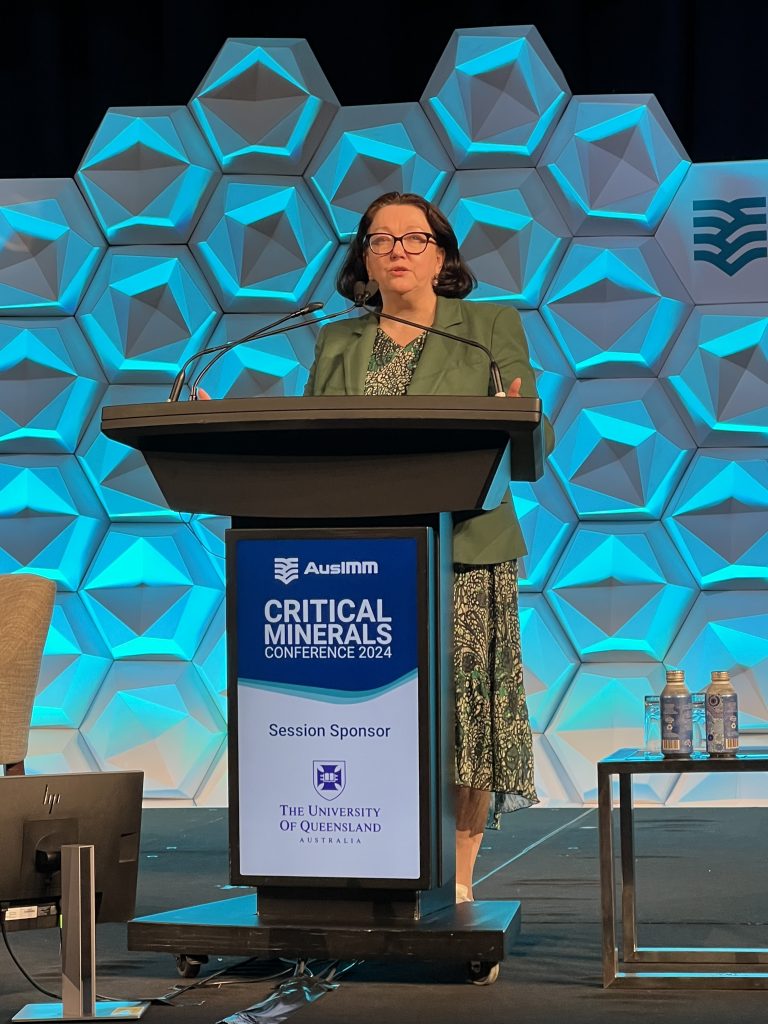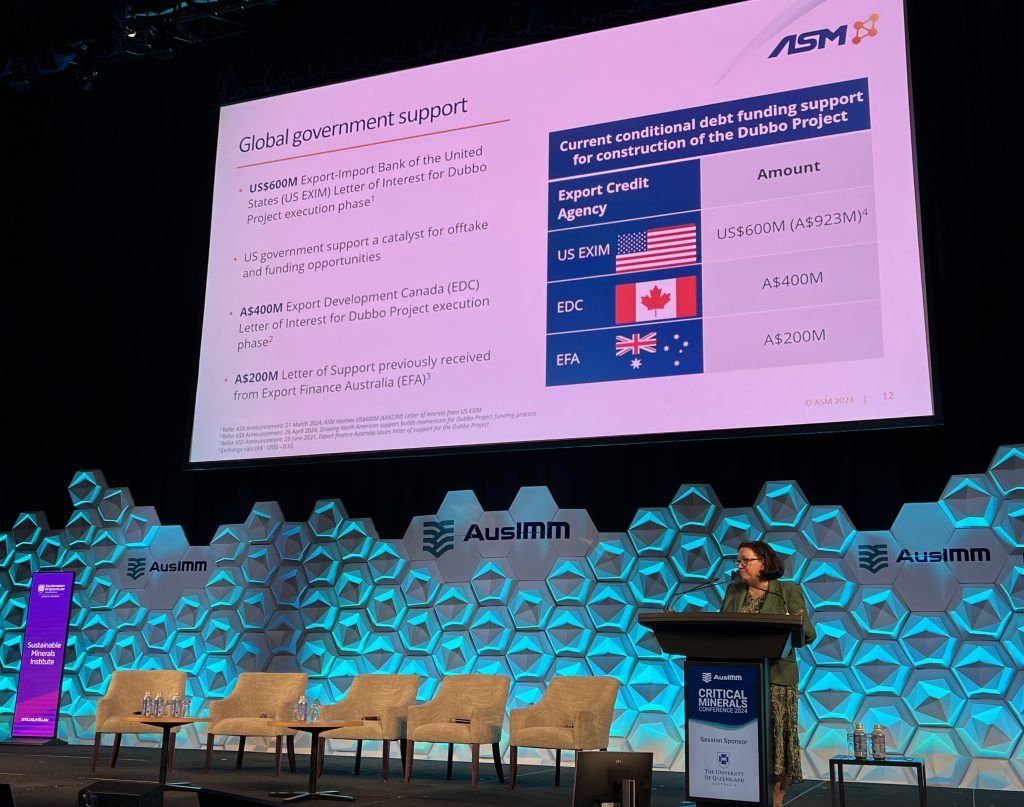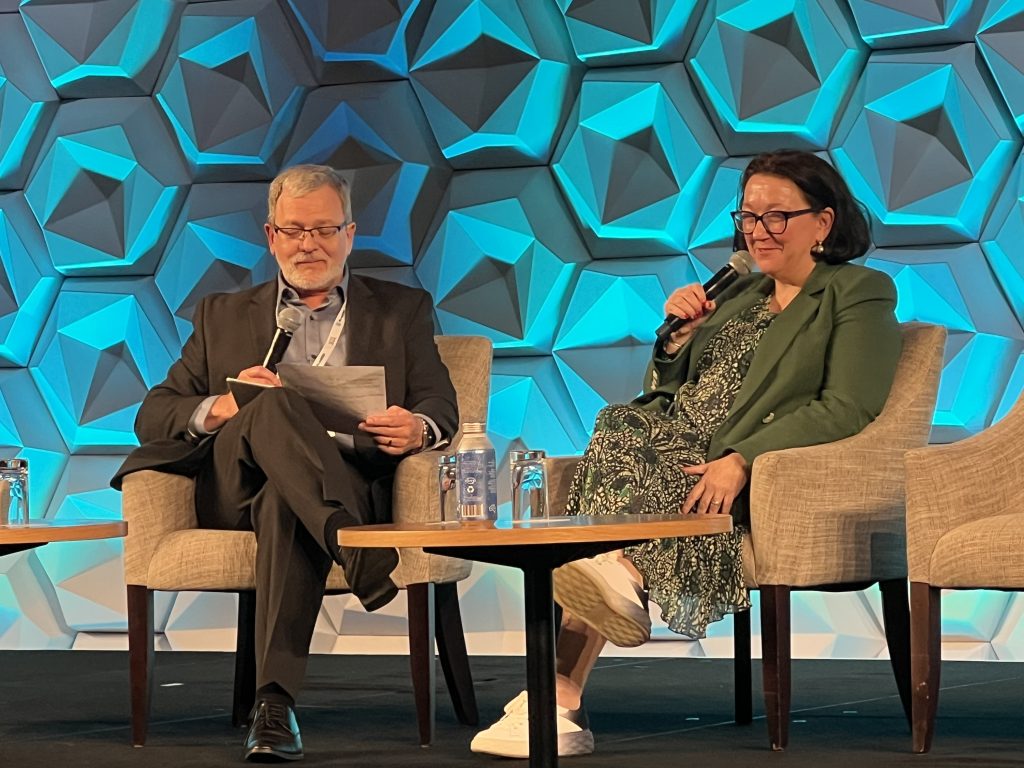ASM Managing Director, Rowena Smith, says Australia has an essential role to play in developing the international partnerships and projects that will deliver alternative, sustainable rare earths and critical mineral supply chains.

The emerging rare earths and critical minerals sector needs to work in collaboration across like-minded jurisdictions if it is to create alternative supply chains outside of China’s dominance, says Australian Strategic Materials Ltd (ASM or the Company) Managing Director and CEO, Rowena Smith.
Presenting to delegates at the 2024 AusIMM Critical Minerals Conference in Brisbane, Ms Smith highlighted that the significant rare earths and critical minerals endowment Australia has – in addition to being a global leader in the extraction and processing of raw materials – positions the country to play an essential role in the development of this geopolitically sensitive market.
“Since the global supply chain disruptions caused by the COVID pandemic, there has been growing recognition that it is not sustainable for rare earths and other critical mineral supply chains to be dominated by a single jurisdiction,” said Ms Smith.
“Combine this disruption with growing global demand for these materials to support renewable energies, electric vehicle manufacturing, defence, aerospace and electronics, and there is an urgent need to build a more diverse industry, capable of meeting this forecast growth.
“With our world class projects and technical capability, Australia can be at the heart of this market, but it will require continued investment and partnership at both a national and international level,” she said.


ASM’s end-to-end offering
ASM is an emerging vertically integrated producer of critical metals, with a mining asset in Dubbo, NSW and state-of-the-art metallisation facility in Ochang, South Korea. The Korean Metals Plant (KMP) opened in 2022 and is producing rare earth metals and alloys for global customers. The Company’s Dubbo Project – a globally significant rare earths and critical minerals project – has all major approvals and permits in place and is construction ready.
ASM is progressing its funding strategy for the Dubbo Project and earlier this year made significant headway with its debt funding component, receiving conditional letters of interest (LoI) from export credit agencies (ECA) in the US and Canada. In March, the Export-Import Bank of the United States (EXIM) indicated support of up to US$600 million (A$923 million1), followed in April by Export Development Canada’s (EDC) indicated support for up to A$400 million.
“We were delighted to announce the LoIs from EXIM and EDC following extensive positive engagement with both countries. The debt funding is linked to the potential US and Canadian equipment, goods and services to be supplied in the construction phase of the Dubbo Project and the key strategic role the Dubbo Project can play in creating an alternative critical minerals supply chain,” said Ms Smith.
“This strong show of support stems from the clear policy alignment between Australia and North American jurisdictions, and ASM’s work to build operational and commercial partnerships in these countries,” she said.
EXIM identifying global opportunities
EXIM President and Chair Ms Reta Jo Lewis gave the opening keynote presentation at the AusIMM event and highlighted the important and growing relationship between the US and Australia.
In 2023, Australia and the US committed to enhance bilateral cooperation under a Climate, Critical Minerals and Clean Energy Transformation Compact. Underscoring the central role of critical minerals to the clean energy transformation, the two countries also established the ministerial-level Taskforce on Critical Minerals. Subsequently, the US awarded Australia ‘domestic source’ status under the US Defense Production Act, paving the way for Australian-based businesses to be eligible to receive loans, grants and purchasing contracts direct from the US Government to support priority sectors, such as critical minerals supply chains, defence applications, and advanced capabilities.
Referring to the critical minerals projects that EXIM is looking to support in Australia during her keynote speech, Chair Lewis, said: “We recognise that demand for critical minerals is growing and it is critical that we work together to identify secure sources of these minerals so we can count on them for national security and vital infrastructure applications…But even as the demand for these minerals grows, geopolitical and project risk to bring new mines into operation will make the process difficult, slow and expensive, and that’s one of the things we’re working very closely on at EXIM Bank. So, we want to let you know that we have your back, as we are trying to move and accelerate these projects forward.”
Partnerships across the value chain
In addition to the US$600 million LoI from EXIM, in April ASM received another LoI for up to US$32 million (A$49 million1) in debt funding to cover Front End Engineering Design (FEED) services at the Dubbo Project. The FEED work is due to be carried out by US-based Bechtel, making the program of work eligible for EXIM’s Engineering Multiplier Program (EMP).
“ASM is grateful to EXIM for its support, and we continue to collaborate with Chair Lewis and the EXIM team to progress this funding opportunity and work through the due diligence process.
“The US represents a key jurisdiction for ASM as we look to build partnerships in support of our strategic objectives. This includes potential new metals and alloys customers for our Korean Metals Plant, sourcing rare earth oxide feedstock while the Dubbo Project is in development, identifying potential OEM offtake opportunities for our critical mineral oxides, and further equity opportunities,” said Ms Smith.

1Exchange rate (A$ : US$) – 0.65

